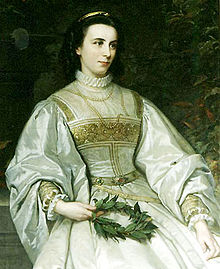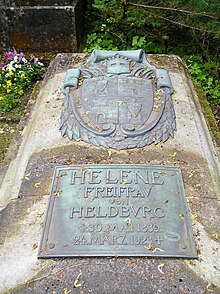Ellen Franz

Hermine Helene Maria Augusta Franz (born May 30, 1839 in Naumburg (Saale) , † March 24, 1923 in Meiningen ), who later became Helene Freifrau von Heldburg , was a German pianist , actress and trainer of theater students .
Life
Ellen Franz was born in 1839 as the daughter of the commercial school director Hermann Franz (1803-1870) and the Scottish noblewoman Sarah Grant in Naumburg an der Saale. She grew up in Berlin, where she took piano lessons from Hans von Bülow . She met Cosima Liszt (later Cosima Wagner) through the well-known conductor , and the two of them formed a lifelong and close friendship. She then took acting lessons from Frieb Blumauer and Heinrich Marr . Franz made her debut as an actress in Gotha in 1860 , after which she was engaged in Stettin , Frankfurt an der Oder , Oldenburg and Mannheim . Ellen Franz came to the court theater in Meiningen in 1867 through the Shakespeare translator and artistic director Friedrich von Bodenstedt . There she performed in leading roles in the youth field until 1873. As early as 1868 she became the lover of Duke Georg II of Saxony-Meiningen , who was also the artistic director of the theater and was working on reforming the directorial theater. As a celebrated actress, Ellen was able to bring decisive impulses to Georg's reform work.
On March 18, 1873, she married Duke Georg II in the Villa Feodora in Bad Liebenstein . Because of her bourgeois origin, the duke ennobled her shortly before the marriage with the name and title of Helene Freifrau von Heldburg , which she wore from then on. She was the Duke's third wife. In 1878, through the marriage of Georg's son Bernhard, she became the mother-in-law of Charlotte of Prussia , the eldest sister of the future German Emperor Wilhelm II. Wilhelm II was so upset by the morganatic marriage between Helene and Georg II that he neither liked Meiningen nor visited the summer residence Schloss Altenstein .
Georg II and Helene, together with the director and artistic director Ludwig Chronegk, carried out a profound theater reform based on the “ Meininger Principles ” and made the Meiningen Court Theater world famous. Helene did a lot of work in the dramaturgy and was responsible for engagement and casting decisions and the training of young students. Her husband Georg II directed together with Chronegk and designed the appropriate sets and costumes ( see article: Meininger ). The friendship between Helene and Cosima Wagner resulted in a collaboration between the Meiningen court orchestra , Richard Wagner and Johannes Brahms, and Hans von Bülow's engagement as court music director.
After the death of George II in 1914, she spent a lot of time on her country estate, the Veste Heldburg . From 1918 she lived in the “Helenenstift” palace, a widow's residence built for her in 1891/92 (today Palais am Prinzenberg ). After her death, Helene was buried next to Duke Georg II in a shared grave complex in the Meiningen Park Cemetery. She was obviously on friendly terms with the natural scientist Ernst Haeckel , who referred to her in a dedication copy of his last book “Kristallseelen” on November 2, 1917 as a “nature lover and artist” and dedicated the copy to her “in grateful memory and admiration”. Her estate is in the Meiningen State Archives .
Helenenstraße has been named after Helene since 1899 in a residential area in the west of the city, where the Helenenstift is also located.
Works
- Else von Hase-Koehler (Ed.): Fifty years of happiness and suffering. A life in letters from the years 1873–1923 . 2nd edition Koehler & Amelang, Leipzig 1926.
literature
- Ludwig Eisenberg : Large biographical lexicon of the German stage in the XIX. Century . Verlag von Paul List , Leipzig 1903, p. 279, ( Textarchiv - Internet Archive ).
- Eva Hoffmann-Aleith : Ellen Franz. Evangelische Verlagsanstalt, Berlin 1989, ISBN 3-374-00808-9 .
- Hans Knudsen : Franz, Ellen. In: New German Biography (NDB). Volume 5, Duncker & Humblot, Berlin 1961, ISBN 3-428-00186-9 , p. 374 ( digitized version ).
- Kuratorium Meiningen (Hrsg.): Lexicon for the history of the city of Meiningen. Bielsteinverlag, Meiningen 2008, ISBN 978-3-9809504-4-2 .
- Norbert Klaus Fuchs: The Heldburger Land - a historical travel guide. Rockstuhl Publishing House, Bad Langensalza 2013, ISBN 978-3-86777-349-2 .
Web links
- Literature by and about Ellen Franz in the catalog of the German National Library
Individual evidence
- ↑ Peter Schmidt-Raßmann: Meiningen as it used to be. Wartberg Verlag, Gudensberg-Gleichen 1992, p. 17.
| personal data | |
|---|---|
| SURNAME | Franz, Ellen |
| ALTERNATIVE NAMES | Franz, Herminie Helena Marie Auguste; Heldburg, Helena Freifrau von |
| BRIEF DESCRIPTION | German pianist, actress and trainer for theater students |
| DATE OF BIRTH | May 30, 1839 |
| PLACE OF BIRTH | Naumburg (Saale) |
| DATE OF DEATH | March 24, 1923 |
| Place of death | Meiningen |
